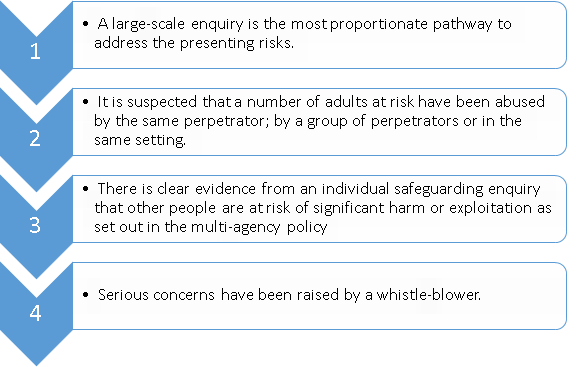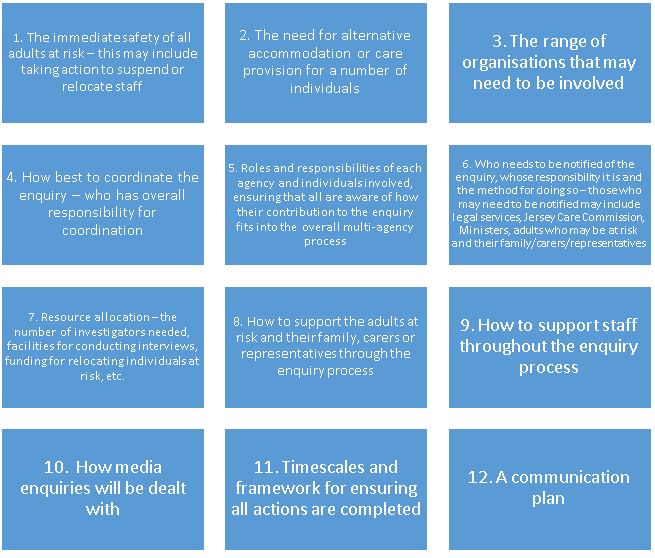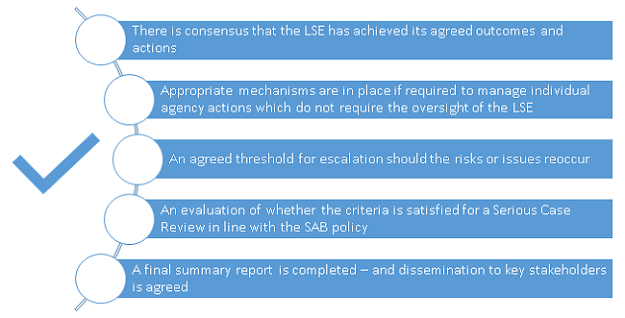Large Scale Enquiries (LSE)
Large-scale (adult safeguarding) enquiries differ from organisational abuse enquiries (covered in Chapter 6 of these procedures). Large scale safeguarding enquiries may include: whole service issues (e.g. Winterbourne View, Gosport War Memorial Hospital), individuals (e.g. Dr Harold Shipman, Jimmy Savile) or other aspects such as death cults, incitements for mass suicides or new and emerging large-scale matters that negatively affect or influence, or prey upon vulnerable people.
N.B. Accumulated complaints about a Regulated Service Provider are likely to be managed and overseen by Jersey Care Commission (JCC) not adult safeguarding, unless JCC are the referring agency initiating the LSE.1. Criteria For Undertaking An LSE

The Adult Safeguarding Team manager will apply judgment as to whether and when a concern requires a large-scale enquiry.
2. Escalation
The following core group will be appointed to oversee or inform Large Scale Enquiries. This is an escalation pathway requiring managerial oversight from senior officers.
- Team Manager – Adult Safeguarding;
- Designated Nurse;
- Chief Social Worker;
- Chief Nurse;
- Chief Inspector (Jersey Care Commission);
- General Manager (ASCT or Mental Health);
- Police;
- Commissioning (and contracts);
- Head of Quality & Safety (Health);
- Communications Dept.
It is expected that a minimum of FOUR core attendees will play a part in any large-scale enquiry – and provide objectivity, professional challenge and scrutiny. The Safeguarding Team Manager will Chair large-scale enquiries routinely. Substitute Chairs will be appointed on a case-by-case basis, from core group members only.
3. Invitations
As with all safeguarding enquiries, other agencies and invitees will be considered for possible inclusion in LSE enquiries dependent on the nature of the concern being raised.
For example (not exhaustive list):
- Law Officer's Department (Representation);
- Manager from the Adult Social Care or Mental Health Team(s);
- The professional raising the concerns;
- Primary Care GP;
- Family Nursing (Operational or Safeguarding Lead);
- Probation Services;
- Advocacy services / Independent Capacity Advocates;
- Other investigating teams /authorities;
- Service providers;
- Health & Safety Inspectorate;
- Public Health;
- Other invitees as requested e.g. specialists.
4. Purpose of the LSE
- To accept collective responsibility for the LSE for its duration;
- To provide managerial oversight at a senior level;
- To ensure empowerment of people affected in decision making and informed consent with access to independent advocacy as appropriate;
- To ensure proportionate intervention with the least intrusive response appropriate to the risks presented;
- To risk manage the enquiry at a strategic level and to provide clear instruction and actions regarding the conduct of the enquiry;
- To receive reports and information, monitor progress, identify further areas for improvement and develop action plans as appropriate;
- To ensure the enquiry in relation to each individual agency is effectively coordinated and delivers its action plan;
- To act as a conduit of communications for all partner agencies at a local and strategic level;
- To ensure resources, knowledge and expertise are available to conduct and support the Investigation;
- To ensure appropriate and consistent representation to the meetings;
- To ensure transparency and clear lines of accountability in the conduct of the enquiry;
- To participate in the de-escalation process and recommendations to the Safeguarding Partnership Board in relation to future inter-agency learning including policy, procedure and practice guidance if appropriate.
5. The LSE Strategy Meeting will need to Consider

6. Core Agenda for LSE Meetings (with Scope for Additions)
- Introductions, and confidentiality matters;
- Brief synopsis of concerns raised, and who is involved / implicated;
- What are the risks, who do they impact upon, likely outcome without intervention?
- What action has already been taken to minimise risks?
- Are there any criminal proceedings to be considered?
- Are there any regulatory requirements / enforcements?
- Regulation and contractual history of service(s) or named personnel;
- Contractual / legal implications;
- Abilities and co-operation of any service provider to highlight concerns and take effective remedial action;
- Details of funding arrangements / responsibilities/ risks;
- Known health and social care needs of people accessing the service (including capacity and decision making);
- Previous independent support offered by advocacy / ICA;
- Are there appropriate risk, health and care management plans in place to safeguard people with care and support needs?
- Need for further enquiry or enquiries;
- Need for remedial contractual actions, e.g. suspensions or transfer of services;
- Agree action plan: timescales, and responsible officers;
- Resources and funding;
- Agree communications strategy;
- Agree date of follow up meeting to review progress.
7. LSE Reviews
The LSE Chair will consider inviting all involved agencies to participate in a review of the enquiry process.
The purpose of LSE review meetings is to:
- Provide feedback on the different strands of investigation;
- Plan further actions;
- Evaluate progress of previously agreed actions;
- Evaluate ongoing risk.
It is the responsibility of the LSE Chair to convene review meetings and ensure appropriate and consistent attendance.
8. Large Scale Enquiry - Closure
An LSE closure meeting will take place to ensure:


